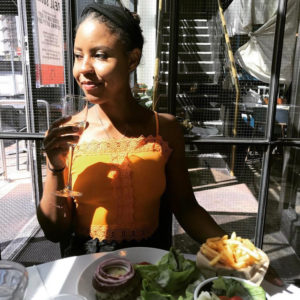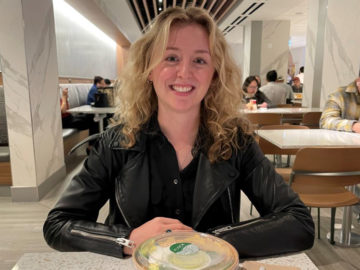Adult Allergies
Sorry Not Sorry for My Food Allergies
In Britain, where apologizing is as much a part of life as having a cup of tea, I was constantly 'sorry' for my food allergies. A move to the U.S. cured me of this.
Growing up in the British culture was incredible, but one thing that always confused me was that we apologize for everything – even when things clearly aren’t our fault. We Brits use the word ‘sorry’ non-stop out of politeness and not wanting to cause a fuss. While that is partly true, this reflex creeps in to other areas. Sometimes we are apologizing for just being there, for merely existing.
I saw that happen with me and my food allergies. I was continuously sorry for having them, as if I was the one who wanted them in the first place! In effect, I was apologizing for my existence, which includes them.
It is no secret that Brits say ‘sorry’ all the time. One survey found the average English person says it between eight and 20 times a day. There are several articles that explain why, and where this comes from.
Sorry, Sorry, Sorry

Research finds that most of the British public says ‘sorry’ continuously for expressing empathy, not generally as an apology. Brits also tend to not to draw attention to themselves or be in someone else’s personal space; we often apologize when those circumstances occur. “Sorry” can mean – I need to get past (used instead of “excuse me”). It may be used to get someone’s attention, or even reflexively uttered when somebody bumps into you.
‘Sorry’ can be a strong and powerful word, but when used as a passive constant, I find it loses potency and worse, can make its user feel unworthy and a nuisance. I love our culture and that we do apologize for the weather. But, as I got older, that ‘sorry’ seeped into my allergy-related interactions, and I began to feel the negative effects.
Apologizing like this prevented me from being confident with my allergic condition. I was saying sorry to staff, who told me that I couldn’t eat at their restaurant, and to friends when I brought my own allergy-friendly food. I clearly remember saying ‘sorry’ when I didn’t shake the hand of someone, who had just eaten nuts. While meaning to be polite, I was actually apologizing for my own safety. It was a form of social cohesion and that mindset was ingrained in me, until I moved to the United States.
Eureka Moment in the USA

When I first arrived in the U.S. in 2008, I was 16 years old. I noticed that Americans have their own form of politeness. They are polite in the shops and to their neighbors, but they weren’t saying sorry. It was the first time that I, as a customer, was right. It was the first time that dining establishments accommodated me and my food allergies because they wanted my business. I saw that I didn’t need to say sorry – there was nothing to apologize for.
At one restaurant, all of my friends had ordered first. When I ordered my food, I said, “I also have severe food allergies – sorry.” The waitress looked at me, slightly perplexed, and said: “Why are you apologizing, that’s not something to be sorry about.” What she said in that moment changed a lot for me. I was able to see my conditioning, my unconscious words.
Saying sorry is powerful, and I had been using it so much that it didn’t have much value left. I started to find peace with not apologizing for precautions required for my survival, and I started to feel confident about my presence.
To Sorry or Not to Sorry…
In the last few years, I have thought long and hard about the word ‘sorry’. I have read articles about how women say sorry more times than men, and the way we can hide parts of ourselves for the approval of others. I started to slowly use it only for how it is meant to be used – “feeling regret or penitence” or “feeling sympathy with someone else’s misfortune.”
I apologize if I have kept someone waiting, if I hurt someone, either emotionally or physically, or for something I regret doing. No longer will I say sorry for someone bumping into me, getting another’s attention, needing to pass or, most importantly, for my food allergies.
Words matter, and what you say to the world is important because it is a reflection on what you say to yourself. There needs to be a distinction, and saying sorry for your medical condition, how you live your life or being in a place (like a restaurant) shouldn’t be in your self-talk.
Remind yourself that your allergies are nothing to be ashamed or remorseful about. They are a part of you and they do not define you. You have the right to live your life with allergies – and don’t be sorry when you do.
You are not an annoyance, don’t be sorry for protecting yourself or a loved one. Change sorry to “I appreciate”. Instead of, “sorry I can’t eat here,” make it: “I’d appreciate if we could go somewhere else”. “Sorry that has nuts” can become “I appreciate you eating something else”.
Say sorry when you truly mean it. I’d appreciate it.
Lindiwe Lewis is a writer and allergy advocate based in London, England. Visit her website TheAllergyTable.org to see more of her work.
Related Reading:
Food Challenges You, But It Can Also Change You
I Swear, You Just Can’t Take Me Anywhere
It’s High Time Restaurants Got Serious About Food Allergies
Main Stock Photo: Getty Images


